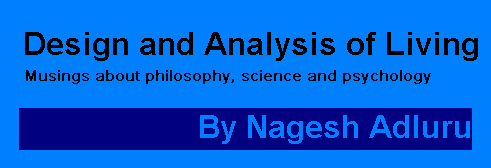Lately, I have been increasingly gravitating towards following Obama's talks in his presidential campaign. Needless to say his speeches are very enticing. His audacious "walk-through reasoning" approach is quite refreshing and rigorous and can stimulate lot of ordinary people to improve their efficiency in dealing with their day-to-day issues. He clearly stresses on a contest based on relevant observables and merit based on policies instead of fighting on something personal and irrelevant. Sounds like a computational guy to me. Alan Turing (a Computer Science hero) argued something like this on defining artificial intelligence and you can see a nice post on it by Scott here.
Now this is very refreshing to see a politician with such perspectives. A lot must be learnt from him by politicians in India and probably all around the world. To contest based on reason with rigor avoiding "easy" and "nasty" tricks is no simple task. In his interview at Google last year one of the audience asked him what he had learnt from past democrat candidates who lost the elections, he said the main mistakes were that they were not clear of what they stood for and hence became defensive when they were attacked and actually sounded like their opponents. Being clear and honest and courageous and rational all go together. It's takes a holistic approach to be rigorous and effective in getting things done.
He admits he may not be perfect and may make mistakes but will make his government very transparent that can actually unleash the true power of democracy. His repeated indications that a democratic government's success is measured by the standard of living (including freedom) of majority of the population show his strong understanding of the fundamentals. There will always be ordinary and extraordinary people in the world at any given point of time. It's the self-justified goal of humanity that the quality of life of all humans should increase. Simply speaking it should be ordinary that ordinary people should be able to dream, strive and hope to be extraordinary while pushing the bar being of extraordinary to next level. He is a great example to show subtle differences between idealism and extremism, between fundamentalism and being strong in fundamentals, between having true high-level knowledge and hand-waving.
For me Scott:Computer Science :: Barack::Politics. Scott's core love for science, his results and his talent in presenting the results and Barack's core love for democracy and his talent in pooling people together are truly truly awesome. I truly wish (unfortunately I cannot vote this time, not being a citizen) that he wins but we surely can gain a lot just from his campaign.
Saturday, August 23, 2008
Monday, August 18, 2008
Democrats and republicans
I have not been following the US presidential campaigns closely but lately I have been listening to some speeches by Barack Obama (thanks to my brother, Ganesh's enthusiasm in his speeches).
Just yesterday I listened to his (only part1) and John McCain's interviews with Rick Warren on CNN videos. Both speeches were good and clearly represented their parties' ideals. McCain's answers were short and clear while Obama's were long and complex. This was apparent starting with response to simplest questions like "State three wise men you would seek advice from" to complex issues like "Abortion". McCain's answers reflected gradient descent type approaches while those of Obama did MCMC type. No doubt both parties are dedicated to USA's growth and its benefit to the world. Both greedy deterministic approaches and probabilistic approaches have advantages and disadvantages depending on problem space: distribution of the problem instances. The main challenge in deciding whom to vote iswhat is to clearly understand the current problem instance and intelligently choose the better strategy. As is evident from the history republican strategy works most of the times. This is true in many optimization problems: gradient descent, though a local optimizer works in many many practical cases. But in hard cases when we need real "landscape shifts" in searching for the solutions we stand a better chance with probabilistic and "holistic/global" approaches. Such approaches tend to be computationally hard and require cleverer design of algorithms for feasibility.
Citizens of USA have been smart enough to choose Democrats a few times but I hope they realize this is one of those times again.
Just yesterday I listened to his (only part1) and John McCain's interviews with Rick Warren on CNN videos. Both speeches were good and clearly represented their parties' ideals. McCain's answers were short and clear while Obama's were long and complex. This was apparent starting with response to simplest questions like "State three wise men you would seek advice from" to complex issues like "Abortion". McCain's answers reflected gradient descent type approaches while those of Obama did MCMC type. No doubt both parties are dedicated to USA's growth and its benefit to the world. Both greedy deterministic approaches and probabilistic approaches have advantages and disadvantages depending on problem space: distribution of the problem instances. The main challenge in deciding whom to vote is
Citizens of USA have been smart enough to choose Democrats a few times but I hope they realize this is one of those times again.
Subscribe to:
Comments (Atom)
